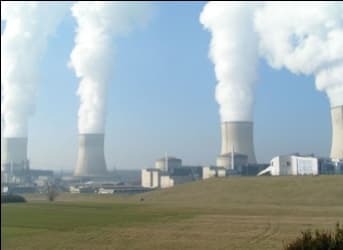While the 11 March 2011 nuclear catastrophe at Fukushima has caused a lot of soul searching among many countries with civilian nuclear energy programs, the picture changes when it comes to nuclear power ‘wannabe” nations.
Many downplay safety concerns, preferring to see nuclear power generation of electricity as a quick fix to soaring energy import costs as well as a way to add a massive number of megawatts to the national grid at a stroke. And for those nations with a green conscience, an added benefit is that nuclear power plants (NPPs) to not generate greenhouse gases.
This argument plays off the fact that about 90 percent of South Africa’s energy is currently generated by coal thermal plants, making the nation the world’s 11th highest carbon emitter. A single company, the state-owned Eskom, generates 95 percent of the country's electricity.
The latter argument is being advanced by South Africa’s Energy Minister Dipuo Peters, that South Africa's plan to build NPPs is not a quick fix solution to the country's energy crisis but rather, a step closer to generating cleaner energy.
According to the Treasury's 2012 Budget Review, tabled last week by Finance Minister Pravin Gordhan, the government's integrated resource plan (IRP) aims to boost South Africa electricity generation by scaling up nuclear electrical output to 9.6 gigawatts by 2029.
And who is going to build these NPPs?
Why, a possible Franco-Chinese alliance.
According to French utility EDF CEO Henri Proglio, the company plans to bid for a contract to build nuclear reactors in South Africa, and "We are in a position to either offer a fully French technology, such as the EPR (next generation nuclear reactor), or a Franco-Chinese technology in partnership with Areva and China Guangdong Nuclear Power Corp."
But sticker shock may yet enter into the government’s equations. During a 28 February media briefing, Peters said that the $40 billion allocated in the state budget for building new NPPs is not the final amount for the project, commenting, "I think that the amount of money that has been allocated... for the nuclear construction program is not a thumb-suck, and we don't actually think that is the end amount, but we believe that it is the beginning." Further hedging her bets, Peters declined to give further information on the specifications or tenders for the NPPs, stating, I don't want to preempt the work of (the government's) nuclear energy coordinating committee," adding that the media would be kept posted once the information was available.
Political opposition is rising to the government’s proposed nuclear program, along with sticker shock. Leading the opposition is Democratic Alliance energy spokesperson Lance Greyling, who decried the relative lack of governmental debate on the issue, stating that Parliament had to have the opportunity to "reverse the silence" on the matter. Warming to his theme, Grelying continued, "Strangely, neither President (Jacob Zuma) nor the Minister of Finance saw fit to mention the largest-ever procurement in South African history in the state of the nation address or the Budget speech. This is despite a surreptitious R300 billion ($40 billion) allocation appearing in the 2012 Budget Review. Not only will it cost nearly a third of our annual budget, but there are serious safety and environmental concerns to consider." Greyling concluded by stating that the DA party would not allow government's nuclear plans to be executed under a "cloud of secrecy."
Nuclear industry insiders expect a tender for constructing up to six South African NPPs by June.
Given the hefty nuclear option price tag, one might wonder why renewable energy isn’t getting a broader hearing.
Well, as most know, energy production usually involves significant amounts of money, and the World Bank has just levied a $9.5 million fine on French engineering company Alstom Corp., involved in the South African nuclear industry, and blacklisted two of its subsidiaries for - bribery. An Alstom subsidiary provides services for the Koeberg nuclear power station, South Africa’s sole NPP and the only one on the entire African continent, and is angling to be a potential player in South Africa’s procurement of new nuclear generating capacity.
Gee!
Bribery?
In Africa?
In the energy industry?
Do you think?
One can only applaud Greyling’s initiative.
By. John C.K. Daly of Oilprice.com


















